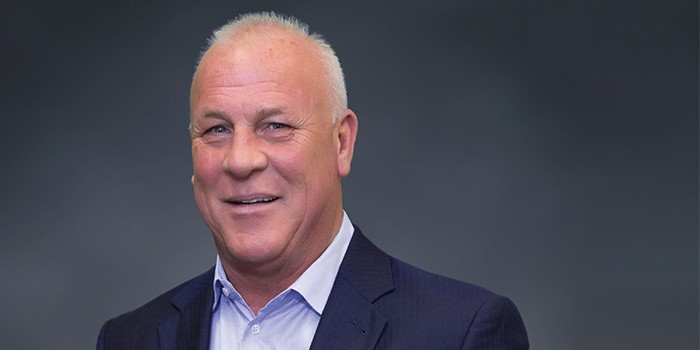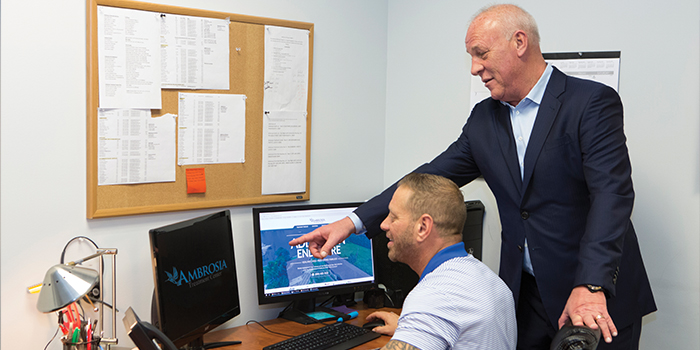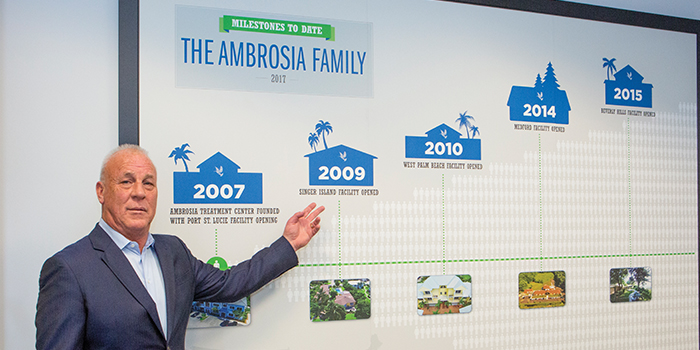Florida Coast Magazine
- 561-768-9793
- email us
- Jupiter, Florida, United States


JUPITER, FL – April 30, 2018 – Addiction is a sensitive topic that is heavily debated on whether it is a choice or a sickness, and to be clear, I am not out to discuss it either. Instead, I want to tell the story of a man who doesn’t put any label on addiction, and has dedicated his life to facilitating recovery of afflicted individuals who want to seek guidance to not only beat it, but to grow as a person.
The man in question did not expect his life to reach the balanced height of success and fulfillment he experiences today. He has created a business that functions only to help others and through it he has created lasting relationships with thousands of individuals and families who will never forget the imprint he has made on their lives. His name is Jerry Haffey.

It is important to Jerry to analyze the data of patient feedback and growth within the Centers to continuously improve programs.
Jerry’s story begins on the streets of Philadelphia, where a modest upbringing taught him that he needed to make his own way to get ahead. At a young age he started working as an apprentice with the Philadelphia Union Carpenters, Local 1856. Although he stayed with them for 10 years, he always knew in the back of his mind that he was meant to do more. After his apprenticeship, he decided he wanted to pursue a career in the medical industry and went back to school at Drexel University where he earned his Bachelor of Science in Nursing.
In 1989, he began working at the University of Pennsylvania Hospital as a cardiothoracic nurse in the cardiac unit. As the drug epidemic was at a high, he noticed that patients with alcohol or substance dependency were not receiving the same level of care that patients without it were getting.
“I felt that negative stigmas were correlated with that population, so things were very biased. They are just as important as any other patient and I felt that they deserved to be treated fairly,” explains Jerry.
After his tenure at Pennsylvania Hospital, he segued into the medical sales field with Hill-Rom and moved to Medline Industries thereafter, which meant that he and his family needed to relocate to Port St. Lucie, Florida. During that time, Jerry saw his opportunity to help change the outlook on addicts through public awareness and to build treatment centers of his own.
“I hired a consultant, spent 18 months coming up with a business plan, took out a small loan, and ended up with opening our first facility of Ambrosia Treatment Centers on October 7, 2007,” Jerry says with a smile.
The center broke ground in Port St. Lucie, Florida, and had an almost instantaneous impact in the community. Over the course of the next eight years, Jerry opened four more treatment centers in Singer Island and West Palm Beach, Florida, Medford, New Jersey, and Beverly Hills, California. What began with 10 employees and 20 patients, has now grown to 300 employees and over 15,000 treated clients. And of those clients, Jerry has awarded over $5,000,000 of free scholarships to over 5,000 patients in order to provide the in-depth, one-on-one treatment that these individuals would not be able to receive otherwise.

The West Palm Beach Center provides an upscale residence with flat screen TVs, a serene pool, and more.

The Singer Island location (above and below) overlooks the tranquil waters of the Intracoastal and specializes in an adult treatment program.

Due to his honorable mission to dedicate his life to changing the reputation and therapy of patients in treatment centers, in 2016 he was awarded “The Humanitarian Award” by the Harold and Carole Pump Foundation, an organization that raises funds and creates awareness for the treatment and cure for cancer.
Jerry confirms that the most important components to making a successful center are the size of groups, years in business, and family and legislation involvement.
“If you are a reputable place, you want the family involved and you want to help them along the way as well with support groups, speakers, and more. It is also important to have ties within legislation in order to work with lobbyist groups to help improve the centers,” affirms Jerry. “We find that it is key to have small groups of six to eight people in order to dig deep and deal with their core issues. There are anywhere from 35 to 46 patients at each center at a time.”

Jerry points out the timeline of the growth of the centers from 2007 until present day. A sixth location will be opening soon.
To continue his lifelong mission, Jerry wants to expand his reach of helping individuals heal by providing a program for veterans at the Ambrosia Treatment Centers. Jerry’s son is a veteran himself, so he has seen first-hand what the effects of PTSD can do to an individual and does not feel that retired members are treated at the level they deserve when transitioning back from battle. Currently, Jerry and his team are working on developing a three to six-month program to help rehabilitate affected soldiers.
“We want to help the community in any capacity that we can. Whether it is from a personal or an educational standpoint, we want to be able to help and change people’s lives for the better,” wholeheartedly states Jerry. “The best thing is to see a patient’s soul come to life again after treatment. It shows that everything I have done has been worth it.”
For more information on Ambrosia Treatment Centers, go to www.ambrosiatc.com.